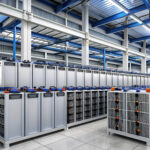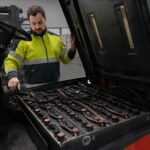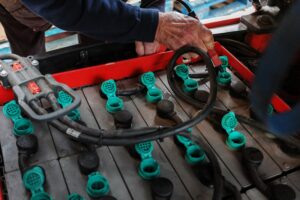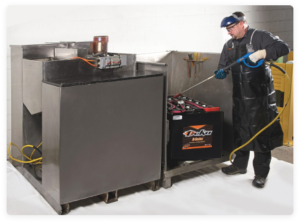Properly maintaining industrial batteries ensures their longevity, efficiency, and safety. One key aspect of battery maintenance is proper watering. However, not all watering systems are the same.
Choosing the right battery watering system can save time, reduce labor costs, and prevent costly damage to your equipment. Here’s a guide to help you select the best system for your needs.
Why the Right Battery Watering System Matters
Industrial batteries, particularly lead-acid batteries, require consistent watering to maintain proper electrolyte levels. While watering is a must, how your facility manages this process will determine the labor cost and efficiency over time.
Using the right battery watering system ensures that your batteries are kept with precision, efficiency, and safety.
Without the right system, there’s a greater risk of human error, such as overfilling or underfilling, which can lead to issues like sulfation, reduced battery capacity, or even permanent damage to the battery plates.
By investing in the right solution, businesses can streamline maintenance, cut labor costs, and protect their valuable equipment investments.
Types of Battery Watering Systems
When selecting a battery watering system, it’s important to understand that there are different types available, each designed with a specific purpose in mind. These systems cater to various operational needs, ranging from small-scale manual solutions to fully automated systems for high-demand environments. The right system ensures optimal battery maintenance, improves safety, and aligns with your operational scale and budget.
1. Single-Point Watering Systems
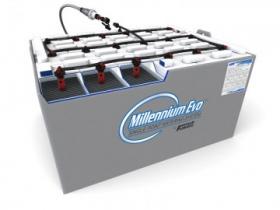
Single-point systems are designed to fill all cells in a battery simultaneously. Each cell is connected by tubing, and water flows through the system to ensure even distribution. These systems are ideal for large fleets of batteries where efficiency is critical.
- Advantages:
- Saves time by filling all cells at once.
- Reduces the risk of overfilling.
- Easy to install and use.
- Best for: Warehouses, distribution centers, and operations with multiple industrial batteries.
2. Manual Watering Guns
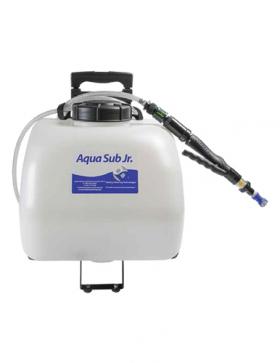
Watering guns are handheld devices that allow precise filling of each battery cell. They typically have built-in flow controls to ensure the right amount of water is added.
- Advantages:
- Cost-effective.
- Provides greater control over the watering process.
- Best for: Smaller operations with fewer batteries with someone knowledgeable about watering batteries.
3. Automatic Watering Systems
These systems are fully automated and integrate with your equipment to monitor and maintain water levels without manual intervention. They are often connected to a central water supply.
- Advantages:
- Completely eliminates manual labor.
- Ensures consistent water levels at all times.
- Best for: High-volume operations with critical power needs.
Whether you’re looking for affordable, flexible, or efficiency, there are systems designed to help you reach your goals.
Factors to Consider When Choosing a System
As we just explored, there are many battery-watering options available. Each system in itself can provide value, so it’s important to understand your needs when evaluating options.
To help you identify the right system, we’ve provided some things for you to consider.
1. Budget
While automated systems offer significant time savings, they come with a higher upfront cost. Evaluate your budget and weigh it against the long-term savings in labor and reduced battery damage.
2. Ease of Use
Look for systems that are easy to install and operate. This ensures your team can quickly adopt the new process without extensive training.
3. Battery watering location and water source
Some facilities have limited water sources. In this case, you may want to look for a portable or refillable watering system that will provide you flexibility with where and how you water your batteries.
4. Durability and Quality
Invest in a system made from high-quality materials to withstand the rigors of industrial environments. Durable systems are less likely to fail, reducing downtime and maintenance costs.
Get Expert Help in Finding The Ideal Watering System
Partnering with an experienced industrial battery supplier can help you navigate the wide range of options and identify the best solution for your needs.
These experts understand the unique demands of different operations and can recommend a system that optimizes efficiency, ensures safety, and aligns with your budget. Whether you’re considering a single-point watering system, a manual watering gun, or a fully automated solution, working with a trusted supplier ensures you’re making an informed investment in proper battery maintenance.
For expert advice in the Mid-Atlantic contact Beal Industrial Products, Inc, your trusted partner in industrial battery care.

